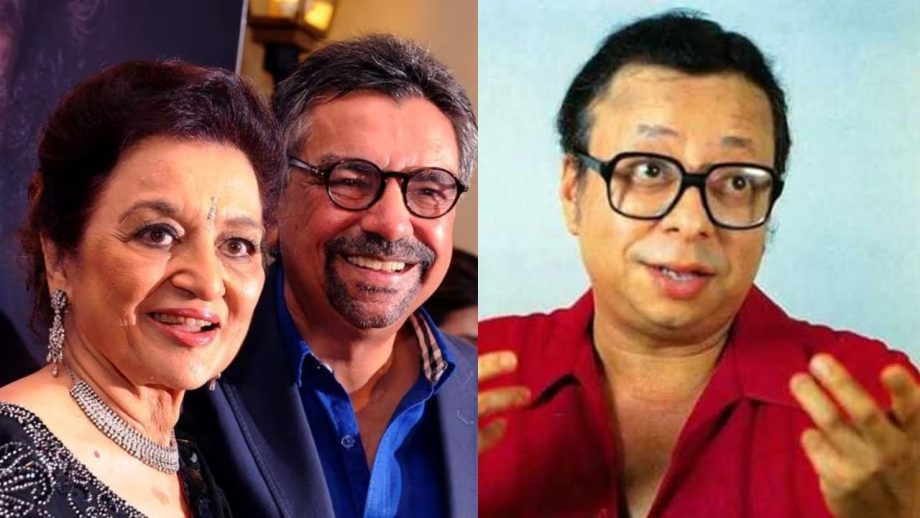If there has never been a music composer as enduring and endearing as Rahul Dev Burman ,then it is equally true to say that there will never be a filmmaker as ebullient and energetic as Nasir Hussain.
A boxoffice wizard , Nasir Hussain spun trueblue musical hits from 1957 to 1985. His cinema stood out for three attributes: they were almost always frothy musicals,most of them starred Asha Parekh(with whom the filmmaker shared an intimate relationship in real life) and the music of R D Burman.
How Burman came into the picture reifies one of those happy coincidences of life that changed the course of Indian cinema.For example, if Dilip Kumar had not opted out of Pyaasa at the last minute, Guru Dutt would not have played Pyaasa.
Shammi Kapoor with whom Nasir Hussain had done two hits film Tumsa Nahin Dekha and Dil Deke Dekho in 1957 and 1959 wanted Shankar-Jaikishan to do the music of Teesri Manzil. Nasir Saab told Shammi(who was known to get his way), ‘Ek naya ladka hai. Burman Dada( S D Burman) ka beta. Zara sun toh lo(listen to his songs).’ Shammi reluctantly agreed, . When he heard RD’s fresh fecund flavourful tunes Shammi fell for them hook line and ‘singer’.
Teesri Manzil was a bonafide musical hit. Take away the chartbusters by Mohd Rafi and Asha Bhosle—O mere sona re,Aaja aaja main hoon pyar tera,Oh haseena zulfon wali, Tumne mujhe dekha, Deewana mujhsa nahin(which later became the title of Nasir Saab’s nephew Aamir Khan’s film)…and what have got.
Asha Parekh who starred in Teesri Manzil recalls the craze for the songs. “I think the songs played a big hand in the success of the films. It was a musical in the true sense. Pancham’s Oh mere son re, Oh haseena zulfon wali and Aaja aaja main hon pyar tera introduced a new youthful sound to our cinema. After Teesri Manzil , Nasir Saab wouldn’t hear of any other music director. We worked together in Baharon Ke Sapne which had lovely songs like Aaja piya tohe pyar doon, Kya Janoon sajan and the all-time hit Chunri Sambhal gori, and Pyar Ka Mausam which too had beautiful songs by Pancham like Tum bin jaaon kahan and Na jao mere humdam.Not many know this but Pancham played a comic role in Pyar Ka Mausam. Then there was Caravan , all-time musical blockbuster.”
After Teesri Manzil(which Nasir Hussain only produced, and Vijay Anand directed and strangely never worked with RD again until Bullet), RD created uninterrupted sparklers for Nasir Saab.
In 1967 Nasir Saab produced and directed Baharon Ke Sapne, his only critically acclaimed neo-realistic film about unemployment. And what a magnificent score RD came up with. Lataji’s Aaja piya tohe pyar doon, Kya janoon sajan and Chunri sambhal(a duet with Manna Dey) is on every RD addict’s playlist.
In 1969’s Pyar Ka Mausam Nasir and R D came together again for a musical blockbuster best remembered for the two-version Tum bin jaoon kahan by Mohd Rafi and Kishore Kumar.Interestingly it was Rafi who sang for the film’s hero Shashi Kapoor, not only in the soulful Tum bin jaoon kahan but also in the other chartbuster Ni sultana re(a duet with Lataji). The Kishore Kumar version of Tum bin jaoon kahan was filmed on the hero’s father played by Bharat Bhushan.
In the 1971 musical blockbuster Caravan it was Lataji and Rafi Saab all the way with Asha Bhosle chipping in with the trippy twosome Piya tu abb to aaja and Abb jo miley hain toh. But the central hit of the score was Lataji’s Dilbar dil se pyare, a zany seduction song that blew the lid off the charts.
By the time Nasir Hussain directed his next blockbuster Yaadon Ki Baraat the tables had turned on Mohd Rafi. He was replaced by Kishore Kumar in almost the entire youthful score with numbers like Aapke kamre mere koi rehta hai and Meri soni meri tamanna. However the film’s biggest hit Chura liya hai tumne still had Rafi saab pitching in with Asha Bhosle.
1977’s blockbuster Hum kissise Kam Nahin was again dominated by Kishore Kumar and Asha Bhosle.But the films’s two biggest hits Kya hua tera wada and the Qawwalli Hum kissise kam nahin went to Rafi Saab.Fun fact about Kya hua tera wada: the music for the opening line was the opening interlude of another R D composition, Tum mujhse roothe ho in the film Phir Kab Milogi.
Zamane Ko Dikhana Hai came 4 years after Hum Kisse Kam Nahin. It was too much of the same thing: same hero(Rishi) and the same dancefloor ditties including an unauthorized version of ABBA’s Mama Mia. However Dil lena khel hai dildar ka, Pucho na yaar kya hua and Hoga tumse pyara kaun were hits. In the last-mentioned song Shailendra Singh who was Rishi Kapoor’s ghost voice in Bobby got to sing for Rishi, apparently on the insistence of Nasir Saab.
The last two R D-Nasir Hussain collaborations Manzil Manzil and Zabardast were massive boxoffice failures . But each had its glorious moment of musical majesty . O meri jaan in Manzil Manzil and Jab chaha yara tumne in Zabardast speak volumes of a partnership that generated acres of mindblowing musicality.
It is believed that R D Burman never got over his disenchantment when Nasir Hussain’s son Mansoor Khan chose Anand-Milind for his directorial debut. An era had ended for both the filmmaker and his composer. When Nasir Hussain was tempted by other filmmakers he would say, ‘Jab tak main hoon, Pancham hai.’
Mansoor says he couldn’t connect with RD. “My father did advice me to work with Rahul Dev Burman. And I even met him. But I felt he was too senior for us to work together as colleagues.I did have a music sitting with RD. But it didn’t workout.”

